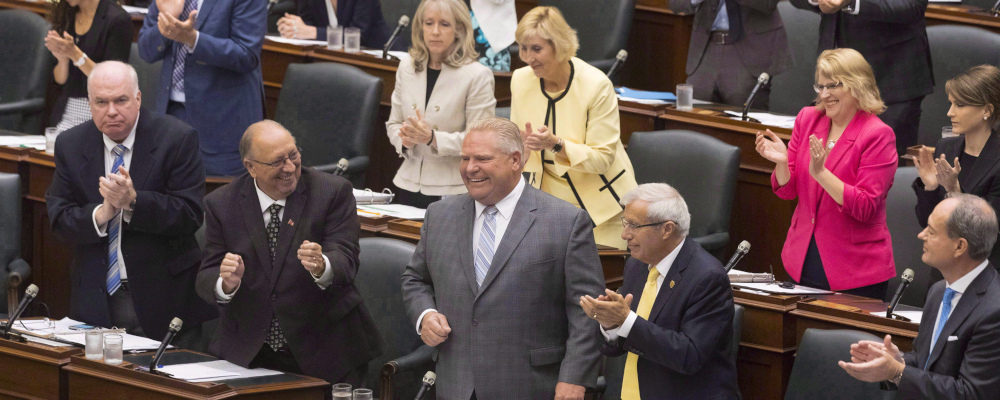Like light from a far-off star bringing us images of the distant past, today’s Supreme Court of Canada decision takes us back to a more innocent time, when what passed for political controversy was a decision to reduce Toronto’s bloated city council from 47 to 25 members just as a city council election kicked off.
Ah, those prelapsarian summer days of 2018! Which of us wouldn’t happily return?
The real controversy, you will recall, the thing that elevated the matter from a routine provincial political controversy into a national talking point, was Ford’s willingness to use section 33 of the Charter of Rights and Freedoms to re-enact the law after it was initially struck down by the Ontario Superior Court. This, predictably, sent all the usual suspects into an ignorant tizzy.
It is one of the more curious aspects of Canadian politics that so many Laurentian luminaries, and Liberals in particular, who are supposed to be the party of the Charter, are so easily triggered by the invocation of section 33. Section 33, is after, all part of the Charter and it preserves at least a residue of the centuries-old democratic powers of our legislatures, including those powers essential to the the principle of Responsible Government.
I am honestly perplexed by this quintessentially American zeal for judicial supremacy within a group of people that is typically reserves the label “American-style” for its ultimate pejorative.
If it were a popular phenomenon, I would blame our abysmal record of civic education, but surely section 33’s high-profile opponents, which include many law professors and former elected officials, know that most of the countries who share our political system — not the U.K, not Australia, and not New Zealand — allow judges to strike down democratically enacted laws in the first place. Section 33 just preserves some of the legislative powers still enjoyed in full by our peer countries.
I am forced to conclude that the allergy to section 33 is part of a latent anti-democratic streak within Canadian liberalism that surfaces whenever a politician or party that is outside the Laurentian consensus has the temerity to win an election. It is part of the assumption by the Rosedale-Outremont axis that “we know best” combined with the sense that the sort of people who get appointed judges are part of that “we” in a way that a grubby provincial legislature may not be.
Ignorance or arrogance, it is a strangely persistent phenomenon that was on full display in 2018 when Doug Ford invoked section 33 to overcome a, shall we say, “novel” interpretation of the Charter by Judge Belobaba of the Ontario Superior Court to strike down the Better Local Government Act, 2018.
There may have been political reasons to oppose the Act, but in this case the judge’s rushed decision ignored two inescapable facts: municipalities, including the megacity of Toronto, are creatures of provincial law; and the political rights in section 3 of the Charter that the judge invoked to strike down the Act do not apply to municipal elections.
The court’s ruling was so constitutionally unorthodox that it’s hard to avoid the conclusion that, faced with the problem that the text of the Charter did not provide a reason to strike down the law, the judge simply decided to rewrite the relevant (or, rather, irrelevant) provisions.
As I wrote at the time: “This impression was reinforced by a smattering of injudicious asides, like his description of the government’s failure to respond to a relatively minor question as ‘Crickets’, and the snide observation that Bill 5 had been drafted ‘more out of pique than principle’ – a charge that could be applied equally to the judge’s opinion.”
When Ford proceeded to use section 33 to allow the Act to proceed over Judge Belobaba’s creative objections, the reaction of the commentariat was furious. But instead of directing their ire at the court that had warped and abused the Charter, these self-styled defenders of the Charter attacked the government that had twice exercised its clear constitutional powers: first in the original Act and then by invoking Section 33.
These fair-weather Charter champions continued to grumble even after the Ontario Court of Appeal overturned the obviously incorrect lower court decision, which obviated the province’s need to rely on section 33. Now, three years later, Ford’s government has been vindicated again as the Supreme Court of Canada has upheld the Ontario Court of Appeal’s decision.
The Court reaffirmed that section 3 does not apply to municipal elections (which is clear from the text) and that the rights contained in section 3 can’t be smuggled into section 2, which protects a completely different set of rights. For good measure, it also explained that unwritten principles of the constitution like “the principle of democracy,” which judges may divine lurking below the actual text cannot be used to invalidate laws.
This is as it always should have been.
Finally, the Supreme Court’s decision should put to rest the two misunderstandings that turned a piece of routine provincial law into a three-year legal odyssey. First, in light of today’s decision, there are limits to judicial creativity when it manipulates the text or relies on “unwritten principles” of the Charter to overturn democratically-enacted laws; second, the need for section 33 will remain strong for as long as courts don’t learn the first lesson.




